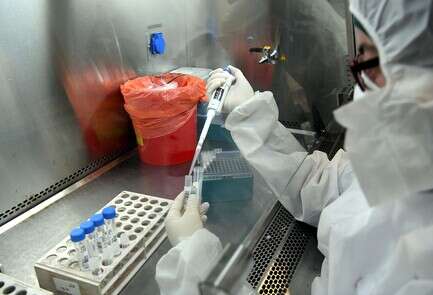The Ministry of Health report reveals: the placements revealed 2,827 carriers only during the past week • Since the beginning of their use, about a month and a half ago, about half a million people were placed in solitary confinement as a result of the placements •
13,586 people were notified last week that they should stay in solitary confinement
Photo:
Joshua Joseph
More than a quarter of those infected in Corona last week (27%) were identified thanks to GSS identification. This is the most prominent figure in the weekly report of the Legal Bureau of the Ministry of Health, which is published once a week and summarizes the identification and isolation.
In absolute numbers, these are 2,827 infected in Corona out of 10,206 last week, which the Ministry of Health sought to identify whoever came in contact with them. A larger number of infected - 3,544 - were subsequently diagnosed for human investigation, and the rest in both methods or in either method. Each of those infected that week came in contact with an average of 4.2 people. 43,464 people were notified last week that they should go into solitary confinement.
Photo: GPO
In addition, another 13,586 people were notified last week that they had to stay in solitary confinement following a human investigation of the infection pathway (epidemiological investigation) - about a quarter of all those detected. In total, more than half a million people have been sent to solitary confinement in the last month and a half since the beginning of the operation of the GSS.
The report also shows that last week there were 13 people who were required to be in solitary confinement and refused to do so, or report that they were in solitary confinement. Information about them was passed on to police. With the subjects - released from isolation.
The Ministry of Health stated that last week 22,554 were received at the "Center of Objections" for appealing against isolation requirements. More than half of the applicants were released from solitary confinement following their application and for 48 the solitary confinement was cut short. The data was provided by Adv. Talia Agmon, Deputy Legal Adviser to the Ministry of Health, to MK Zvi Hauser, head of the Foreign Affairs and Defense Committee. Hauser, it will be recalled, repeatedly asked for the continuation of the placements to be conditioned on the shortening of the isolation period from 14 days to 12 days, in light of the heavy economic consequences for the economy.
"There is no country that puts people in such large numbers and numbers into isolation," Hauser protested. "I intend to demand that alongside the medical report, the Foreign Affairs and Defense Committee be presented with a report from the Ministry of Finance estimating the extent of the economic harm, if the existing policies and the extent of the existing isolations are continued." Hauser is also examining the possibility of restricting GSS placements and not approving their extension, if the number of days of isolation is not shortened.
• Ministry of Health warns: "Not to reach Yarka"
• The Ministry of Health opposes shortening the isolation time
• Gamzo presented the "contingency plan" for the struggle in Corona
Meanwhile, ahead of the Foreign Affairs and Defense Committee's discussion on shortening the isolation period, the Ministry of Health published a position paper over the weekend, which recommends adhering to a 14-day isolation period for those exposed, rather than as short as Hauser demands.
The Ministry of Health presented in the position paper studies that suggested that the average incubation period may be longer than initially estimated, especially in the elderly population. It was also argued, following these findings, that the usual isolation period of 14 days may not be sufficient.
A document from the Corona National Information and Knowledge Center for the Campaign states that in most countries of the world there is a broad consensus that the required isolation time for people who came in contact with Corona patients is 14 days.

